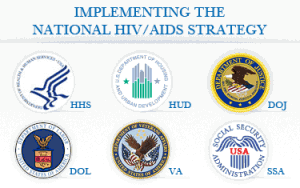Federal Leads Review Progress at One-Year Anniversary
Topics

Dr. Ronald Valdiserri
On the eve of the first anniversary of the National HIV/AIDS Strategy (NHAS), representatives of the six federal agencies tasked by the President with lead responsibility for implementing NHAS gathered for one of our regular meetings and shared updates on implementation progress. Chairing the meeting, the Assistant Secretary for Health, Dr. Howard Koh, praised the participants for the progress being made within and across Departments and for the personal dedication of each of these representatives to bringing the Strategy to life not only within their respective agencies, but also across the nation.
During the meeting, the agency representatives each highlighted some of the significant recent activities underway in pursuit of the Strategy’s goals. These included:

Department of Housing and Urban Development – Among the several activities underway at HUD, according to Mr. David Vos, Director of the Office of HIV/AIDS Housing, are preparations for an upcoming roundtable for faith- and community-based organizations in the mid-Atlantic area that will focus on successful collaborations to provide housing and supportive services to low-income households with a person living with HIV and AIDS, and will to promote understanding to combat stigma and discrimination. HUD is also conducting cross-training with the Health Resources and Services Administration’s Ryan White program project officers at HHS to ensure all share a solid and common knowledge base about HIV/AIDS programs in other departments.
Department of Justice – The DOJ’s Civil Rights Division has developed a subsite within ADA.gov to address civil rights issues related to HIV/AIDS, including the ability to file a discrimination claim online. The office is also preparing an update to its “bench book” for judges regarding HIV/AIDS and civil rights law, according to Ms. Allison Nichol, Chief of the Disability Rights Section of the Department’s Civil Rights Division. CAPT Chris Bina, Pharm.D., reported that the Department’s Federal Bureau of Prisons continues to offer universal HIV testing to all inmates sentenced to a federal facility. The Bureau also recently updated and released its National HIV Practice Guidelines and is preparing a seminar for the system’s healthcare providers about them. CAPT Bina also noted that the Bureau is sharing its best practices regarding both healthcare for inmates with HIV and facilitating linkages to care for HIV positive ex-offenders re-entering the community with their colleagues who administer state and local jails, where the majority of the nation’s prisoners are incarcerated.
Department of Labor – A recent DOL-convened roundtable explored how to improve employment opportunities and outcomes and reduce stigma and discrimination for people living with HIV/AIDS, reported Mr. Dylan Orr, Special Assistant/Advisor to the Assistant Secretary for Disability Employment Policy. In an effort to better coordinate related federal efforts, many of the other lead federal agencies were involved in the roundtable (including the Departments of Justice, Housing and Urban Development, and Health and Human Services, and the Social Security Administration) as well as the Equal Opportunity Commission, the Department of Education, the White House Office of National AIDS Policy, and a number of HIV/AIDS service providers, employers, disability employment advocates, and members of the HIV/AIDS community. On another front, DOL’s Office of Federal Contract Compliance Programs (OFCCP) has launched a system for prioritizing and fast-tracking investigations of employment discrimination complaints based on HIV/AIDS status. OFCCP has also developed public education materials on employment rights under Section 503 of the Rehabilitation Act of 1973 and the Americans with Disabilities Act with emphasis on HIV/AIDS employment discrimination. These materials have been distributed to OFCCP’s field offices and will also be distributed to stakeholders and community groups.
Department of Veterans Affairs – VA’s Dr. Maggie Czarnogorski, Deputy Director, Clinical Public Health Program, reported the Department’s ongoing effort to increase HIV testing among veterans. Based on recently analyzed data, the VA had a 140 percent increase in HIV tests from 2009 to 2010 with over 350,000 tests conducted in 2010. To continue these expanded testing activities, VA has provided grants to 20 VA facilities to expand HIV laboratory testing and is offering an electronic clinical prompt that reminds providers to offer an HIV test, integrating HIV testing into more than 20 Stand Downs for homeless veterans, and capturing and sharing best practices related to HIV testing throughout its network. It is also supporting and working closely with 10 women veterans health programs and preparing to launch a social marketing campaign to promote HIV testing among veterans later this year.
Social Security Administration – The SSA is working to expedite claims identifying HIV/AIDS as the primary qualification, according to Mr. David Rust, Deputy Commissioner for Retirement and Disability Policy. The agency’s entry for HIV/AIDS in the listing of impairments is being updated after over a year of work that included consultations with the community and the Institute of Medicine. Mr. Rust also observed that SSA is working with the Department of Labor on employment opportunities for beneficiaries through its “Ticket to Work” program.
Department of Health and Human Services – Mr. Michael Evanson of the HRSA’s HIV/AIDS Bureau reported on the agency’s recent update to policies governing the use of Ryan White HIV/AIDS Program funds for housing referral services and short-term or emergency housing needs. He concurred with HUD’s David Vos that HHS and HUD will need to work together to help all grantees understand the new policy and what is allowed and required. I also noted that other HHS agencies and offices will be highlighting examples and reflections on their NHAS implementation progress via blog posts and on their web sites.
We also shared with our colleagues from across the government that simultaneous to implementing the NHAS, HHS is also working to implement the recently released Action Plan for the Prevention, Care and Treatment of Viral Hepatitis. This new effort is significant for our federal partners since up to 30 percent of persons living with HIV are co-infected with hepatitis and both infections share commonalities around transmission, so our efforts on either will impact both.
Several of the participants observed that another measure of progress in this first year of collectively pursuing the Strategy’s goals has been the continuation of these regular cross-departmental conversations. Each of our quarterly meetings has offered opportunities for cross-pollinating ideas and engaging in both collaborative and complementary efforts aligned with the Strategy. As each of the lead federal agencies presses forward with its own efforts to implement the National HIV/AIDS Strategy, we will all continue to identify and leverage cross-agency collaborative opportunities that are as yet untapped to ensure better coordination of efforts at all levels and, most importantly, improved outcomes.